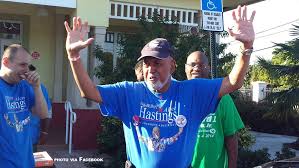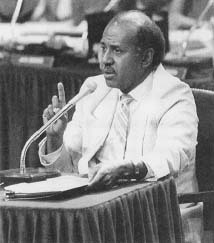The Fight To Replace Alcee Hastings
BY BUDDY NEVINS
U. S. Rep. Alcee Hastings has been Broward County’s de facto black political leader for decades.
Alcee Hastings has been there for the community for as long as almost anybody can remember.
First, as a civil rights attorney. Then, as a judge, pushed off the bench by a group of white politicians. Then in a stunning political comeback, elected to Congress repeatedly for more than two decades.
Now 78, younger rivals for political leadership in the growing African-American and Caribbean-American community are starting to knock on Hastings’ door.
State Sen. Chris Smith, County Commissioners Dale Holness and Barbara Sharief, and others watch Hastings’ health with more diligence than his doctor.
So far he is in great shape.
Alcee Hastings campaigning in 2014
Smith, Holness or Sharief may someday sit in the Congressional seat. But they can never replace Alcee Hastings.
Hastings is one of the few true Broward County political heroes.
As a 1960s era civil rights attorney, Hastings helped pry the door open for blacks. He fought hard-core segregationists who controlled the business and political community in the courts and with his melodious speech.
Young people in today’s liberal Broward County can not even imagine what it was like just 60 or 50 years ago.
Racists like Ben Klassen, the author of The White Man’s Bible who founded the self-proclaimed white supremacist Church of The Creator, was elected to the state Legislature from Lighthouse Point.
Hastings, an outspoken attorney, was a target of those who wanted no change. He was called a radical “monkey” in a hate sheet regularly distributed by the conservatives in the Broward GOP.
This was an era when the Fort Lauderdale newspapers segregated news of blacks under a headline “black news” deep inside the paper. Working for one of those papers, this then-very young police reporter was told by a casually racist editor that we don’t cover murders in “that neighborhood.”
Hastings was fighting this ugly status quo.
Mostly as a symbolic gesture, he ran for U. S. Senate in 1970 for the seat left open after Spessard Holland retired. He campaigned in places where blacks had never entered the restaurants and hotels through the front doors, much less appeared on a ballot.
Hastings got 13 percent of the vote, with Lawton Chiles eventually winning in a runoff.
Becoming a Broward County judge in 1977, Hastings was appointed to the federal bench by President Jimmy Carter in 1979.
In 1981, he was indicted for bribery.
In 1983, he went on trial. Prosecutors could never trace any bribe to Hastings, who largely ran his own defense and testified for 4 1/2 hours.
He was acquitted by the 10 whites and two blacks on the jury.
Asked by reporters in the jubilant courtroom filled with his supporters what he was going to do, Hastings said, “It’s just another day in the life of a poor country boy…Excuse me. I’ve got to call my mama.”
Gotta love him.
Despite the acquittal, Hastings was impeached for bribery and convicted by the Democratic U. S. Senate in 1989.
Alcee Hastings testifying during his Senate impeachment hearing
Voters apparently viewed this as an injustice. In 1992, Hastings was elected to Congress from a District that stretched like a 100-plus long snake from Miramar to the north.
Taking a seat among many of the same members of Congress who voted to impeach him was a vindication….for Hastings and the voters who love him.
Today, Hastings’ 20th Congressional District includes portions of Fort Lauderdale, Lauderhill, Tamarac, Pompano Beach, Deerfield Beach and cities in Palm Beach County.
Some say that the first skirmish in the future fight to replace Hastings already took place in February. There was an election for an open Fort Lauderdale commission seat among a district encompassing many black voters.
Candidate Robert McKinzie got the backing of Chris Smith. Candidate Donna Guthrie was supported by Dale Holness and Hastings.
McKinzie won handily.
But the tiny Fort Lauderdale campaign – McKinzie received 1,305 votes to Guthrie’s 878 – is not a predictor of anything.
Make no mistake.
The struggle to replace Hastings is wide open. I hope this fight is many years in the future. So do many voters.



April 9th, 2015 at 4:37 pm
me thinks you make alcee hastings too much of a victim. the evidence at his trial led to his impeachment because, as I believe a federal panel of judges put it, not guilty is not a good enough standard of conduct for a federal judge. and his impeachment, I do believe, kept him from being the chairman of the house intelligence committee.
April 9th, 2015 at 5:15 pm
One of a kind … Alcee has done more for more people than anyone in local political history; and always a gentleman.
April 9th, 2015 at 6:45 pm
I always thought Carlton Moore was the heir in waiting but with his untimely death, it will be a battle. Or perhaps he will end up like Fidel and just keep on going…..
April 9th, 2015 at 6:59 pm
Gee Buddy. Nice try to cover up a crook. His own group of miscreants convicted him. Your heart is bleeding too much for this scum.
April 9th, 2015 at 10:11 pm
Please let it not be so that Dale Holness, who does not pay property taxes, and Barbara Sharief, who bends major rules regarding money, are in the running to replace Hastings. Isn’t there anybody out there that has more integrity than these two impostors? Someone, please stand up!
April 9th, 2015 at 11:40 pm
Conspiracy, bribery, perjury, falsifying documents, thwarting a criminal investigation, nepotism. This is the black’s great hero?
“In 1981, a federal grand jury indicted Judge Alcee L. Hastings, appointed to the federal district court in 1979, along with his friend William A. Borders, a Washington, D.C. lawyer. Hastings was charged with conspiracy and obstruction of justice for soliciting a $150,000 bribe in return for reducing the sentences of two mob-connected felons convicted in Hastings’ court. A year after Borders was convicted of conspiracy, the result of an FBI sting effort, Hastings’s case came before the criminal court. Despite Borders’ conviction, and the fact that Hastings had indeed reduced the sentences of the two felons, he was acquitted in a criminal court in 1983 and returned to his judicial post.
Subsequently, suspicions arose that Hastings had lied and falsified evidence during the trial in order to obtain an acquittal. A special committee of the 11th Circuit Court of Appeals began a new probe into the Hastings case. The resulting three-year investigation ended with the panel concluding that Hastings did indeed commit perjury, tamper with evidence, and conspire to gain financially by accepting bribes. The panel recommended further action to the U.S. Judicial Conference, which, in turn, informed the House of Representatives on March 17, 1987, that Judge Alcee Hastings should be impeached and removed from office.
On August 3, 1988, following an investigation by the House Judiciary Subcommittee on Criminal Justice, the House of Representatives voted 413 to 3 to adopt H. Res. 499, approving 17 articles of impeachment against Hastings, the greatest number of articles in any impeachment proceeding to date. Charges included conspiracy, bribery, perjury, falsifying documents, thwarting a criminal investigation, and undermining the public confidence “in the integrity and impartiality of the judiciary.” The Senate received the articles on August 9, 1988.
Following the precedent set in the 1986 Claiborne impeachment case, the Senate again chose to refer the matter to a special committee as authorized by impeachment rule XI. On March 16, 1989, the Senate rejected a motion by Hastings to dismiss the case, and adopted S. Res. 38, creating a 12-member trial committee to hear evidence and then report to the full Senate on contested and uncontested facts. The committee was not tasked with making a recommendation on guilt or innocence. Committee hearings continued from July 10, to August 3, 1989. Consisting of six Republicans and six Democrats, the committee heard evidence for and against Hastings, and took testimony from 55 witnesses, including Borders. The House managers presented convincing evidence that Hastings had, indeed, conspired with Borders to solicit the bribe. Hastings, who appeared in his own defense, objected to the use of the committee, insisting that the full Senate should be required to hear evidence. His motion failed. Hastings also insisted that the Senate trial amounted, in legal terms, to “double jeopardy” since he had already been acquitted in a court of law.
The trial committee presented its report on October 2, 1989. Sixteen days later, the trial began in the U.S. Senate, with prosecution and defense given two hours to summarize their cases. The Senate deliberated in closed session on October 19, 1989. The following day, the Senate voted on 11 of the 17 articles of impeachment, convicting Hastings, by the necessary two-thirds vote, on 8 articles (1-5, 7-9). On two articles (6, 17) the vote fell short of the required majority to convict. On article 11, the Senate voted 95 not guilty to 0 guilty. Having achieved the necessary majority vote to convict on 8 articles, the Senate’s president pro tempore (Robert C. Byrd) ordered Hastings removed from office.”
“In 2012, Hastings was ranked No. 1 out of 435 members of the U.S. House of Representatives for paying salaries and fees to family members by the conservative watchdog group Judicial Watch.[24] A 300-page report published by the Citizens for Responsibility and Ethics in Washington found that Hastings paid his girlfriend $622,574 over the four-year period 2007-2010.”
April 10th, 2015 at 2:39 am
Congressman Alcee Hastings and his staff both in dc n ft Lauderdale has always helped his constituents as I his constituents can testify first hand. Unlike some unnamed congressmen n senators in Florida has staff doesn’t send out form letters or only send us requests only for money.
April 10th, 2015 at 6:02 am
The Hon. Judge Hastings was not convicted by his own group, he was removed on a majority vote. My recollection is that they used an ‘expert’ to testify that the cadence of his voice implied guilt – not unlike ‘expert’ testimony of the 20s’ that read the lumps on the defendant’s head to determine criminal tendencies! This was later proven junk science and completely specious. His trial and subsequent impeachment were race based.
April 10th, 2015 at 1:20 pm
Nobody will support Holness or anyone he had ties too. He is as dirty and sneaky as they come. Nothing but a self proclaimed its all about be just like his friend thecSheriff another all about me politico. Holness and Israel are nothing but users and only care about themself and don’t care about it bring at everyone else’s expense. What has Holness really done. He goes to meetings and takes credit for anything and everything and had nothing yo do with either. Did he do the write self serving thing by trying to bash Shariff for Mayor do he could be the first AAA Mayor another self serving move. How did that work out for you Dale!! You got bitch slapped and rightly so. Your Sheiff friend is another ethics violator with big problems too.
April 10th, 2015 at 4:06 pm
>> first AAA Mayor
Huh? Do I need to call Dale if my car breaks down?
April 10th, 2015 at 4:12 pm
Alcee was no George Allen.
April 10th, 2015 at 7:30 pm
Quite a difference between “pushed off the bench by a group of white politicians” and Sam the Sham’s comment with details of the impeachment.
April 11th, 2015 at 8:33 pm
You nailed it Sam…sleazy, corrupt and unethical through and through. That’s Alcee Hastings!
Political hero?…Come on Buddy!